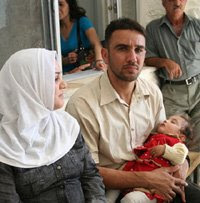Increased domestic violence among Iraqi refugees - IOM report
Iran News
"Most families prefer to sweep their problems under the carpet because [to them] reputation matters more than anything else," said Shankul Kader from the Jordanian-Iraqi Brotherhood Society, a non-governmental organisation trying to help the Iraqi community in Jordan.
"The fact that most men are forced to stay at home due to the lack of jobs, and the lack of social interaction among the refugees, has heightened tension in households," the study said. It revealed that 15 percent of women interviewed in female-only focus groups reported an increase in family violence.
"A well-raised Iraqi woman should tolerate everything in silence... My husband has no other way to get rid of his anger," one woman told researchers.
Since the US-led invasion of Iraq in 2003, over half a million Iraqis have moved to Jordan, hoping to return home when things improve.
Few jobs
Most Iraqis in Jordan are middle class, but over the years their savings have run down, and there are few jobs. Only about 22 percent of Iraqi adults in Jordan work; the rest are jobless, according to a recent study by the Norway-based FAFO Institute for Applied International Studies.
A large number of Iraqis rely on financial aid from relatives outside the Middle East, mostly in Australia, Canada, New Zealand and Sweden, while others rely on temporary jobs, as immigration rules prevent them from holding permanent jobs.
"Men resort to violence because of social and economic pressures. Iraqis in Jordan are living in constant worry about their future," Shankul said.
Activists involved in helping Jordanian women survive domestic violence say their doors are open to Iraqi women. Asma Khader, a women's rights activist and lawyer, said the Jordan Federation for Women is engaged in activities to help abused Iraqi women. "Social barriers remain the biggest challenge in tackling domestic problems," she told IRIN.
0 comments »
Leave your response!